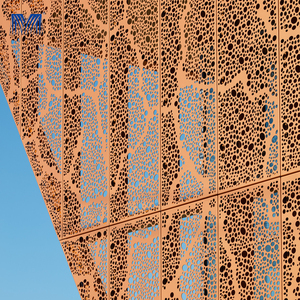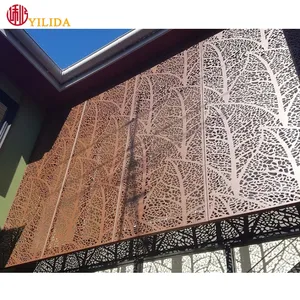
All categories
Featured selections
Trade Assurance
Buyer Central
Help Center
Get the app
Become a supplier

(3922 products available)














































Metal mesh cladding is a type of architectural cladding that uses wire mesh made of metal as the primary material. It is used as a protective and decorative covering on the exterior of buildings or structures. The metal mesh facade cladding is installed over the walls or entire buildings to enhance their aesthetics. They come in a variety of designs that offer different visual effects, such as depth, light diffusion, and transparency.
These are the various kinds of metal mesh facade cladding:
Woven mesh is a popular choice for facade cladding. It is made by weaving wires, where each wire is interlaced with the vertical and horizontal wires. The wires are woven tightly to create a strong mesh panel. Woven mesh is available in different weave patterns, such as plain, twill, and Dutch weave.
Expanded metal mesh cladding is produced by cutting and stretching a metal sheet to create an open grid pattern. The mesh has a three-dimensional surface that provides an interesting texture for facade cladding. It is made of aluminum, stainless steel, or galvanized steel. Expanded mesh is lightweight, which makes it a suitable choice for large-scale facade projects.
Perforated metal mesh has holes punched into the metal sheet. The holes can have different shapes, such as square, round, rectangular, or slotted. The perforated mesh offers good ventilation and light transmission. It also provides privacy for the buildings.
Ring mesh is also known as chain link mesh. It is made of interlocking metal rings that create a flexible and transparent surface. The rings are linked to form a continuous mesh. Ring mesh is installed like a curtain on the facade of the building. It allows the wind and light to pass through.
Decorative mesh is made of woven, perforated, and expanded mesh. It has a unique design that offers a decorative element for facade cladding.
Metal coil drapery is a new type of metal mesh facade cladding. It is made of metal coils that are woven together. The coils are connected to create a flexible and lightweight mesh curtain. Metal coil drapery is available in various colors that can be customized to match the design of the building.
When it comes to the functions of a metal mesh cladding, it is worth noting that each of these functions is important to the façade. In this case, a metal mesh facade cladding is an exterior layer that is applied to the outside of a building to enhance its appearance. These functions include:
This is the most important function of a metal mesh facade cladding. It protects the building from the harsh elements of the weather. The mesh acts as a shield against the wind, rain, and sunlight. The mesh also provides shade and helps to cool the building during hot weather. The aluminium mesh cladding protects the building from the hot sun, frigid cold, or heavy rains. It also acts as a barrier that keeps the building safe from unwanted intruders. This is because the mesh makes it difficult for anyone to get close to the building.
Another critical function of metal mesh cladding is insulation. This helps to regulate the temperature inside the building. In other words, the mesh keeps the building warm during the winter and cool during the summer. This helps to reduce energy costs by minimizing the need for heating and cooling.
Expanded mesh cladding is essential when it comes to improving the appearance of the building. It offers an elegant look to any building. In this case, the metal mesh facade cladding is available in different colors and patterns. This makes it easy to choose the mesh that matches the style of the building. The mesh is also customizable, allowing one to create a unique design.
The metal mesh facade cladding provides privacy to the occupants of the building. This is because it is difficult to see inside the building from the outside. This is ideal for residential buildings and office spaces.
The mesh allows natural light to pass through, which reduces the need for artificial lighting. This makes the building more energy efficient. At the same time, it creates a bright and vibrant interior space.
The mesh allows air to circulate, which helps to keep the building cool and fresh. This is important for maintaining a healthy indoor environment.
Some metal mesh types can help to reduce noise pollution. This is important for buildings located in noisy areas.
Metal mesh facade claddings offer a wide range of design and functional applications in architectural projects. Here are some common usage scenarios:
Metal mesh cladding can be used to cover the entire exterior of buildings. The mesh panels are attached to the structural framework of the building. The panels provide an outer layer that protects the building from weather, temperature changes, and pollution. The mesh is durable and needs little maintenance. It also allows air to flow through, which can save energy. This is because the building does not get as hot in summer.
The mesh can also be used for sun shading. Engineers can set up the mesh panels to block out some of the sunlight. This helps keep the building cooler inside. As a result, people who work or live in the building may not have to use as much air conditioning. Sun shielding can also be done with expanded metal mesh cladding that have different patterns. The architects and engineers will choose a mesh with the best design to block out the right amount of light.
The mesh is also used to create privacy screens. These screens can be added to the outside of buildings. They can also be installed inside. The mesh panels give the people inside some privacy. At the same time, the mesh allows light and air to pass through. So the screens don't make the inside feel too closed-in or stuffy. Privacy screens are made by attaching mesh pieces to metal posts. The posts are then connected to the floor or ceiling. This makes it easy to move the screens if needed.
Besides exterior applications, metal mesh facade cladding can also be applied to interior design elements. For example, they can be used as wall coverings or partitions in open-plan spaces. Additionally, they can be used in ceilings and stair railings. This provides a cohesive and visually appealing design to the building. Additionally, it allows light and air to flow through, creating a more pleasant indoor environment.
When choosing metal mesh cladding for the exterior of a building, it is important to consider a few things to ensure the right product is purchased.
Each building has its own architectural style. So, it is important to choose façade cladding that complements the overall design of the building. Consider whether the building has a modern or a traditional design. Also, think about the color and the texture of the cladding, as this will impact the building's aesthetics.
When choosing metal mesh cladding, it is important to consider how well it will withstand the elements. Look for materials that are resistant to corrosion, such as stainless steel or aluminium mesh cladding. Also, consider the coating used on the mesh, as this will impact its ability to withstand weathering.
Business owners need to choose metal mesh cladding that is easy to maintain. Consider how often it will need to be cleaned and what products can be used to clean it. Some metal mesh requires specialized cleaners in order to maintain their finish.
The budget that has been set aside for façade cladding is also an important consideration. Some metal mesh materials are more expensive than others. For example, brass is more expensive than stainless steel. Business owners need to make sure they buy a product that meets their needs without going over budget.
Consider how the metal mesh facade cladding will be installed. Some materials are heavier than others, which can impact the installation process. Also, consider whether a professional installer will be required or if it can be done in-house. Some mesh cladding requires special tools and expertise to install properly.
When choosing metal mesh cladding, consider the environmental impact of the materials used. Look for manufacturers who use sustainable practices. Also, consider whether the expanded mesh cladding can be recycled at the end of its life. Recyclable materials are more environmentally friendly.
Q: Is a mesh facade suitable for all building types?
A: Yes, a mesh facade is suitable for most building types, including commercial, residential, and institutional buildings. Mesh facades can be custom designed to meet a building's specific requirements and aesthetic goals.
Q: Are metal mesh facades difficult to maintain?
A: Metal mesh facades are generally low maintenance. However, the maintenance required will depend on the type of mesh used and the environmental conditions. For example, stainless steel mesh offers excellent corrosion resistance and is easy to maintain.
Q: How can the performance of a metal mesh facade be optimized?
A: The performance of a metal mesh facade can be optimized by incorporating elements such as sunshades, insulation, and natural ventilation. Working with experienced designers and engineers will ensure the facade is designed to meet performance requirements.
Q: Can a metal mesh facade cladding be retrofitted onto an existing building?
A: Yes, a metal mesh facade cladding can be retrofitted onto an existing building. This can help improve the building's energy efficiency and give it a modern look. It is important to work with a qualified contractor to ensure the retrofit is done correctly.